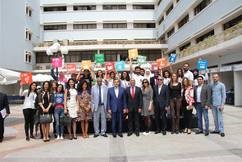Under
the auspices of His Excellency Dr. Khaled Abdel Ghaffar, Minister of Higher
Education in the Arab Republic of Egypt, UNESCO and UNHCR organized on 28 and
29 March 2017 the first-ever Arab Regional Conference on Higher Education in
Crisis Situations, under the theme “Synergizing Policies and Promising
Practices to Enhance Access, Equity and Quality in the Arab Region.’ The
Regional Conference was attended by over 80 participants, including UNESCO
Beirut representatives, high level officials from Ministries and government
agencies responsible for Higher Education from 15 Arab Member States and
Turkey. Regional organizations, civil society organizations and academic
institutions also took active part in the Conference.
The objective of the Conference, was
to engage national authorities and stakeholders in promoting higher education
for those affected by conflict, including refugees, and internally displaced
persons, and to draw attention to the urgent need for higher education in times
of crisis. The Conference was also in full alignment with the commitments made
by Member States to the Sustainable Development Agenda, more specifically Goal
4, also known as Education 2030, which includes the provision of higher
education and vulnerable populations.
Commending Member States’ tremendous
efforts made by the refugee hosting governments and communities to accommodate
and provide for those in need, including higher education opportunities, UNESCO
expressed concern about the detrimental impact that the multiple and often
protracted crises in the region will have on the lives and livelihoods of the
millions of affected peoples, paying particular attention to the urgent need of
enhancing knowledge and skills for youth. Furthermore, it was highlighted that
while basic education in times of crisis enjoyed significant support, more
attention was needed for post-basic education, in particular higher education.
In his opening remarks, Dr.
Ezzeldeen Abousteit, representative from the Ministry of Higher Education and
Scientific Research, Egypt, acknowledged the immense needs to cater for the
learning needs of refugee and displaced youth and reminded the participants
that they gathered to open the window of opportunities for refugee and
displaced youth’s safe passage to higher education.
During the Conference, participants
highlighted the challenges in the provision of higher education in crisis
situations. These issues included policy barriers, coordination, recognition of
prior learning, data management systems and capacity building.
Discussion around alternative
pathways to higher education that could broaden access in a cost-effective way,
such as Connected Learning Programmes, were also discussed.
After two days of fruitful, forward
looking deliberations from the perspectives of Member States as well as those
of participating organizations, the Meeting culminated in the adoption of the
“Sharm El Sheikh Statement on Higher Education in Crisis Situations in the Arab
States” which sets out recommendations by participants to be undertaken to
improve access to higher education for those affected by crisis and overcome
the main barriers. More specifically, participants endorsed the idea that there
is a need to mainstream crisis in national higher education planning and
policy. In addition, the recognition of studies and qualifications should be
facilitated. Furthermore, it was agreed that cooperation should be enhanced at
both the national and regional level between all relevant stakeholders, and
that data collection and management should be improved for policy dialogue, and
programme planning and implementation.
With this adoption UNESCO and UNHCR
reaffirms their commitment to accompany and support Member States to build
resilience and mitigate the harmful effects of crisis.


